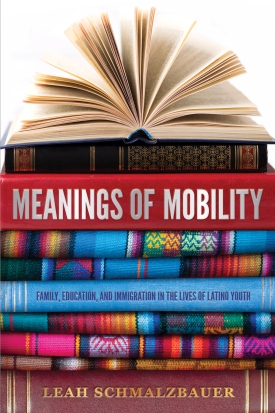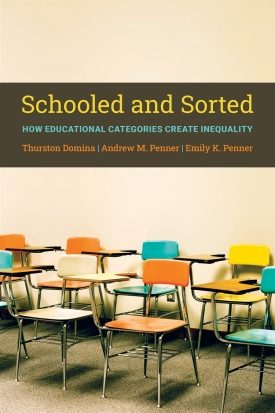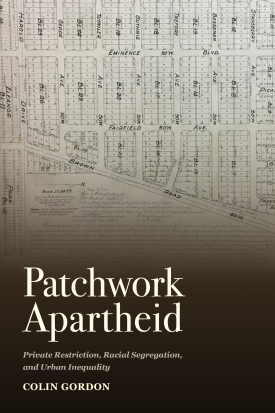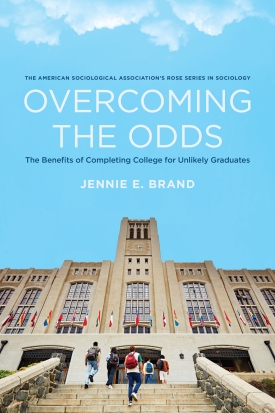Many of the eight million people receiving benefits from the Supplemental Security Income (SSI) and Social Security Disability Insurance (SSDI) programs live in rural communities with high rates of program participation. Although there is a substantial literature on the labor market effects of these programs, less is known about the community impacts of concentrated disability. Sociologist Ryan Parsons will examine the impact of social security disability programs in rural communities with high rates of program participation.
The home mortgage interest deduction (MID) allows homeowners to deduct the interest paid on the first $750,000 of up to two home mortgages from their taxes and costs the Treasury $26 billion per year. MID benefits are greater for households with higher incomes and larger mortgages, thus disproportionately benefiting Whites over Blacks. Sociologists Joe LaBriola and Chinyere Agbai will examine the effects of the MID on the White-Black wealth gap since 1984. They will analyze data from the National Bureau of Economic Research’s TAXISM program for their study.
Those convicted of a felony can be legally denied housing, employment, occupational licenses, and the right to vote. Research has considered the long-lasting consequences of prior incarceration for both individuals and intergenerational inequality, but two-thirds of former felons who were never imprisoned remain understudied. Sociologist Brielle Bryan will examine the extent to which felony convictions shape renters’ housing options and whether other characteristics such as race, gender, and neighborhood poverty rate, impact residential opportunity.
Universities have tried to increase socioeconomic diversity through financial aid interventions, with some success. However, we know little about the combined effects of financial aid offers, options students consider, and how they assess their alternatives on the college decisions of high-achieving, low-income students. Sociologists Stefanie DeLuca and Elizabeth Burland will investigate how high-achieving, low-income students make postsecondary education decisions.

Meanings of Mobility
About This Book
American Educational Studies Association Critic's Choice Book Award Winner
"In Meanings of Mobility, Leah Schmalzbauer carefully and in precise detail documents the costs—psychic and embodied—of children of immigrants’ class mobility through elite educational pathways. Driven by love and a desire to make good on parents’ sacrifices, poor and working-class students of color understand that academic excellence only leads to financial success when they can proficiently enact the cultural norms of privileged whiteness. Readers get to witness through these students’ own accounts how they make sense of the tough choices an elite college education presents: the spectrum runs from returning to community to contribute to social justice to leaning into racial capitalism to acquire wealth."
—LEISY J. ABREGO, professor and chair, Chicana/o and Central American Studies, UCLA
"A compassionate and detailed exploration of how young adult children of Latin American immigrants navigate a privileged college environment. Leah Schmalzbauer follows the stories of a new generation of young adults who attend a top liberal arts college, seeking an education in elite spaces while balancing family obligations and the stress of the COVID pandemic. Highly informative and deeply moving, Meanings of Mobility sheds light on how higher education works for a select group, and what needs to change to provide such access to others."
—JOANNA DREBY, professor of sociology, University at Albany
"With penetrating prose, Leah Schmalzbauer provides an intimate portrait of how poverty shapes undergraduate life at even the wealthiest institutions of higher education. Moreover, she forces us to grapple with the simple yet overlooked fact that students do not come to college alone; families come to college. Through revealing interviews with students and their families, Meanings of Mobility outlines the pitfalls and promises of pursuing higher education for the most vulnerable members of society. And with care and attention born of a dedicated scholar, Schmalzbauer provides insights into what can be done to make our institutions not just accessible, but inclusive."
—ANTHONY A. JACK, assistant professor of education, Harvard University
Over the past twenty years, elite colleges and universities enacted policies that reshaped the racial and class composition of their campuses, and over the past decade, Latinos’ college attendance notably increased. While discussions on educational mobility often focus on its perceived benefits – that it will ultimately lead to social and economic mobility – less attention is paid to the process of “making it” and the challenges low-income youth experience when navigating these elite spaces. In Meanings of Mobility, sociologist Leah C. Schmalzbauer explores the experiences of low-income Latino youth attending highly selective, elite colleges.
To better understand these experiences, Schmalzbauer draws on interviews with 60 low-income Latino youth who graduated or were set to graduate from Amherst College, one of the most selective private colleges in the United States, as well as their parents and siblings. The vast majority of these students were the first in their immigrant families to go to college in the U.S. She finds that while most of the students believed attending Amherst provided them with previously unimaginable opportunities, adjusting to life on campus came with significant challenges. Many of the students Schmalzbauer spoke with had difficulties adapting to the cultural norms at Amherst as well as with relating to their non-Latino, non-low-income peers. The challenges these students faced were not limited to life on campus. As they attempted to adapt to Amherst, many felt distanced from the family and friends they left behind who could not understand the new challenges they faced.
The students credit their elite education for access to extraordinary educational and employment opportunities. However, their experiences while in college and afterward reveal that the relationship between educational and social mobility is much more complicated and less secure than popular conversations about the “American Dream” suggest. Many students found that their educational attainment was not enough to erase the core challenges of growing up in a marginalized immigrant family: many were still poor, faced racism, and those who were undocumented or had undocumented family members still feared deportation. The challenges they faced were only intensified by the COVID-19 pandemic.
Schmalzbauer suggests ways institutions of higher education can better support low-income Latino students and lower the emotional price of educational mobility, including the creation of immigration offices on campus to provide programming and support for undocumented students and their families. She recommends educating staff to better understand the centrality of family for these students and the challenges they face, as well as educating more privileged students about inequality and the life experiences of their marginalized peers.
Meanings of Mobility provides compelling insights into the difficulties faced and the resilience demonstrated by low-income Latinos pursuing educational and social mobility.
LEAH C. SCHMALZBAUER is Karen and Brian Conway ’80, P’18 Presidential Teaching Professor of American Studies and Sociology, Amherst College
RSF Journal
View Book Series
Sign Up For Our Mailing List
Apply For Funding

Schooled and Sorted
About This Book
"This highly accessible and engaging book is rich with sociological insight. While recognizing the inevitable sorting role of schools, the authors offer a creative road map towards a more equitable future in education—and in life."
—ADAM GAMORAN, president, William T. Grant Foundation
"We all know that schools sort kids into good and bad jobs. This elegant little book reminds us that schools are also relentless categorizers inside their gates: the free-lunch kids learn they’re poor, the honors kids learn they’re special, and the ‘first years’ learn they’re far from first. Schooled and Sorted makes a brilliant case for regaining control over the categories that define our children’s lives."
—DAVID B. GRUSKY, Edward Ames Edmond Professor in the School of Humanities and Sciences and director, Center on Poverty and Inequality, Stanford University
"Schooled and Sorted makes a convincing case that it takes more than just skill-building curricula and effective teachers for a school to provide its students with ladders to the middle class. When schools also make well-intentioned efforts to boost achievement and motivate students by grouping or categorizing them, the results can be counterproductive. This book explains why and what can be done about them."
—GREG J. DUNCAN, distinguished professor, School of Education and Departments of Economics (by courtesy) and Psychology and Social Behavior (by courtesy), University of California at Irvine
We tend to view education primarily as a way to teach students skills and knowledge that they will draw upon as they move into their adult lives. However, schools do more than educate students – they also place students into categories, such as kindergartner, English language learner, or honor roll student. In Schooled and Sorted, Thurston Domina, Andrew M. Penner, and Emily K. Penner, explore processes of educational categorization in order to explain the complex relationship between education and social inequality – and to identify strategies that can help build more just educational systems.
Some educational categories have broadly egalitarian consequences. Indeed, Domina, Penner, and Penner argue that when societies enroll young people in school, making them students, they mark them as individuals who are worthy of rights. But other educational categories reinforce powerful social categories – including race, gender, and class – and ultimately reproduce social and economic inequality in society. Elite colleges, tracked high schools, and elementary school gifted programs provide not only different educational experiences, but also create merit and inequality by sorting students into categories that are defined by the students who are excluded.
Schooled & Sorted highlights that many of the decisions that define educational categories occur in school-based committee meetings and other relatively local settings. The local nature of these decisions provides many opportunities to define educational categories differently, and for school communities to bring about change.
Schooled & Sorted is an illuminating investigation into the ways sorting within schools translates into inequality in the larger world. While some educational categorization may be unavoidable, the authors suggest ways to build a more equitable system – and thus a more equitable society.
THURSTON DOMINA is Robert Wendell Eaves Sr. Distinguished Professor in Educational Leadership, University of North Carolina, Chapel Hill
ANDREW M. PENNER is a professor of sociology, University of California, Irvine
EMILY K. PENNER is associate professor of education, University of California, Irvine
RSF Journal
View Book Series
Sign Up For Our Mailing List
Apply For Funding

Patchwork Apartheid
About This Book
"Patchwork Apartheid is a landmark study of racial capitalism and social inequality in the United States. By putting newly available data into dialogue with detailed local histories, Colin Gordon takes readers beyond the storylines and summary facts that typically guide discussions of residential segregation in America. More than any other work I know, this book brings residential segregation into focus as a social, economic, and political process in motion—and as a process in which private actors and market agreements played preeminent roles in constructing the nation’s racial and spatial boundaries. Beautifully written and powerfully argued, Patchwork Apartheid should appeal to public and academic audiences alike. It is essential reading for anyone who wants to understand the origins, operations, and consequences of residential segregation in America."
—JOE SOSS, Cowles Chair for the Study of Public Service, University of Minnesota
"Colin Gordon is a singular historian, and this is a singular book. Patchwork Apartheid itemizes the schemes and evasions by which white homeowners continued to insist on their right to assert and convey their right to all-white neighborhoods (and an all-white sector of the housing market) long after the United States Supreme Court had ruled those rights to be legally unenforceable. Gordon is a master of summoning historical particulars into a dramatic refiguration of our understanding of the time and space of American history."
—WALTER JOHNSON, Winthrop Professor of History and professor of African and African American Studies, Harvard University
"Patchwork Apartheid is a remarkable contribution to the rapidly evolving scholarship on the origins of segregation in America. Gordon marshals an unprecedented amount of data to document how private restrictions established racial barriers dividing neighborhoods, suburban subdivisions, and society as a whole. These individual agreements made in the first half of the twentieth century could not be more relevant today, as we collectively grapple with the legacy of our explicitly segregationist past."
—JACOB FABER, associate professor of sociology and public service, Robert F. Wagner School of Public Service, New York University
"Colin Gordon’s prodigious research results in a groundbreaking comparative study of the history, structure, and lasting impact of racially restrictive covenants in an important swath of Midwestern cities. In describing the experience of these central locations, Patchwork Apartheid illustrates important reasons for our national patterns of metropolitan-wide residential segregation."
—CAROL M. ROSE, Gordon Bradford Tweedy Professor Emeritus of Law and Organization and professorial lecturer in law, Yale Law School
For the first half of the twentieth century, private agreements to impose racial restrictions on who could occupy property decisively shaped the development of American cities and the distribution of people within them. Racial restrictions on the right to buy, sell, or occupy property also effectively truncated the political, social, and economic citizenship of those targeted for exclusion. In Patchwork Apartheid, historian Colin Gordon examines the history of such restrictions and how their consequences reverberate today. Drawing on a unique record of property restrictions excavated from local property records in five Midwestern counties, Gordon documents the prevalence of private property restriction in the era before zoning and building codes were widely employed and before federal redlining sanctioned the segregation of American cities and suburbs. This record of private restriction—documented and mapped to the parcel level in Greater Minneapolis, Greater St. Louis, and two Iowa counties—reveals the racial segregation process both on the ground, in the strategic deployment of restrictions throughout transitional central city neighborhoods and suburbs, and in the broader social and legal construction of racial categories and racial boundaries.
Gordon also explores the role of other policies and practices in sustaining segregation. Enforcement of private racial restrictions was held unconstitutional in 1948, and such agreements were prohibited outright in 1968. But their premises and assumptions, and the segregation they had accomplished, were carried forward by an array of private and public policies. Explicit racial restrictions were accompanied and sustained by the discriminatory business practices of real estate agents and developers, who characterized certain neighborhoods as white and desirable and others as black and undesirable, thereby hiding segregation behind the promotion of sound property investments, safe neighborhoods, and good schools. These practices were accompanied and sustained by local zoning, which systematically protected white neighborhoods while targeting “blighted” black neighborhoods for commercial and industrial redevelopment, and by a tangle of federal policies that reliably deferred to local and private interests with deep investments in local segregation. Private race restriction was thus a key element in the original segregation of American cities and a source of durable inequalities in housing wealth, housing opportunity, and economic mobility.
Patchwork Apartheid exhaustively documents the history of private restriction in urban settings and demonstrates its crucial role in the ideas and assumptions that have sustained racial segregation in the United States into the twenty-first century.
COLIN GORDON is a professor of history at the University of Iowa
***
Interactive maps, datasets, and codebooks
The datasets linked below show the spatial location of racial restrictions on property in the City of St. Louis and St. Louis County in Missouri, and in Black Hawk and Johnson Counties in Iowa. Each zipped file contains a Geographic Information System (GIS) shapefile, and a codebook (describing the shapefile attributes) in CSV format. The data for Hennepin County, Minnesota was collected by the Mapping Prejudice project.
St. Louis and St. Louis County
Title: Racial Restrictions in the City of St. Louis
Published Date: 2023
Author: Gordon, Colin
Author Contact: colin-gordon@uiowa.edu
Type: Dataset, Spatial Data
Description: This data was compiled by Colin Gordon. It shows the location of racial restrictions on property use recorded in the City of St. Louis between 1890 and 1955. The data for this project were sourced from historical property records (deeds, indentures, agreements, plat maps) held by the Recorder of the City of St. Louis. Restrictions were identified using a register of property restrictions maintained by the St. Louis Title and Abstract Company. Restricted parcels were matched to current parcels using plat maps and the legal descriptions in the current records. In cases where the original parcels have been subject to resubdivision or redevelopment, original plats were used to re-create the historical parcels.
Funding information: Project funding and in-kind support were provided by the National Endowment for the Humanities, the City of St. Louis, the University of Iowa Vice President for Research, the National Endowment for the Humanities, the Commonwealth Fund (Harvard), Legal Services of Eastern Missouri, the Metropolitan St. Louis Equal Housing and Opportunity Council, and the St. Louis Association of Realtors.
Citation: Racial Restrictions in the City of St. Louis, Missouri [Dataset]
Title: Racial Restrictions in St. Louis County
Published Date 2023
Author: Gordon, Colin
Author Contact: colin-gordon@uiowa.edu
Type: Dataset, Spatial Data
Description: These data were compiled by Colin Gordon and show the location of racial restrictions on property use recorded in St. Louis County between 1890 and 1955. The data for this project were sourced from historical property records (deeds, indentures, agreements, plat maps) held by the Recorder of St. Louis County. Restrictions were identified using plat maps and a card file of property restrictions maintained by the St. Louis County Recorder. Restricted parcels were matched to current parcels using plat maps and the legal descriptions in the current records. In cases where the original parcels have been subject to resubdivision or redevelopment, original plats were used to re-create the historical parcels.
Funding information: Project funding and in-kind support were provided by the National Endowment for the Humanities, the St. Louis County Recorder, the University of Iowa Vice President for Research, the National Endowment for the Humanities, the Commonwealth Fund (Harvard), Legal Services of Eastern Missouri, the Metropolitan St. Louis Equal Housing and Opportunity Council, and the St. Louis Association of Realtors.
Citation: Racial Restrictions in the County of St. Louis, Missouri [Dataset]
Hennepin County, Minneapolis
The data for Hennepin County, Minnesota was collected by the Mapping Prejudice project [Dataset]
Black Hawk County, Iowa
Title: Racial Restrictions in Black Hawk County, Iowa
Published Date 2023
Author: Gordon, Colin
Author Contact: colin-gordon@uiowa.edu
Type: Dataset, Spatial Data
Description: These data were compiled by Colin Gordon, with the assistance of Brayden Adcock, Matt Bartholomew, Kate Dennis, Tyler Dolinar, Carson Frazee, Cori Hoffman, Emily Kehoe, Cassidy Kengott, Christopher Marriott, Charlotte Stevens, Daniel Welsh, and Hannah Wegner. The dataset shows the location of racial restrictions on property use recorded in Black Hawk County between 1910 and 1955. The data for this project were sourced from historical property records (deeds, indentures, agreements, plat maps) held by the Black Hawk County Recorder. Restrictions were identified by searching plat maps, deed books, and deed book indexes. Restricted parcels were matched to current parcels using plat maps and the legal descriptions in the current records. In cases where the original parcels have been subject to resubdivision or redevelopment, original plats were used to re-create the historical parcels.
Funding information: Project funding and in-kind support were provided by the University of Iowa and the Black Hawk County Recorders Office.
Citation: Racial Restrictions in Black Hawk County, Iowa [Dataset]
Johnson County, Iowa
Title: Racial Restrictions in Johnson County, Iowa
Published Date 2023-#-#
Author: Gordon, Colin
Author Contact: colin-gordon@uiowa.edu
Type: Dataset, Spatial Data
Description: These data were compiled by Colin Gordon, with the assistance of Gabe Bacille, Dune Carter, Colton Herrick, Daniel Langholz, Jack Lauer, and Keiran Reynolds. The dataset shows the location of racial restrictions on property use recorded in Johnson County between 1890 and 1955. The data for this project were sourced from historical property records (deeds, indentures, agreements, plat maps) held by the Johnson County Recorder. Restrictions were identified using optical character recognition (OCR) searches of the county’s digitized deed books. Restricted parcels were matched to current parcels using plat maps and the legal descriptions in the current records. In cases where the original parcels have been subject to resubdivision or redevelopment, original plats were used to re-create the historical parcels.
Funding information: Project funding and in-kind support were provided by the University of Iowa and the Johnson County Recorder.
Citation: Racial Restrictions in Johnson County, Iowa [Dataset]
Download
RSF Journal
View Book Series
Sign Up For Our Mailing List
Apply For Funding

Overcoming the Odds
About This Book
A Volume in the American Sociological Association’s Rose Series in Sociology
"With the latest surge in critics questioning the value of college degrees, Overcoming the Odds couldn’t come at a better time. Jennie E. Brand’s book considers the transformative effects of college from a holistic perspective—not just the earnings premium but all the nonpecuniary benefits of earning a degree. Her research is an important contribution to the conversation: yes, a college degree is ‘worth it,’ both for the individual and society at large."
—ANTHONY P. CARNEVALE, research professor and director, Center on Education and the Workforce (CEW), McCourt School of Public Policy, Georgetown University
"In Overcoming the Odds Jennie E. Brand solves one of the great social science puzzles of our time: Would young people who are unlikely to graduate from college get anything out of it if they were lucky enough to get a degree? Brand applied advances in modern statistical inference to arrive at the answer, and it is YES! She illustrates her conclusions with real case studies that reveal the lived experiences behind the statistics."
—MICHAEL HOUT, professor of sociology, New York University
Each year, millions of high school students consider whether to continue their schooling and attend and complete college. Despite strong evidence that a college degree yields far-reaching benefits, some critics of higher education increasingly argue that college “does not pay off” and that some students—namely, disadvantaged prospective college students—would be better served by forgoing higher education to immediately enter the workforce or pursue vocational training instead. But debates about the value of college often fail to consider what each individual’s life would look like had they not completed college, or what is known as a person’s college counterfactual. In Overcoming the Odds sociologist Jennie E. Brand reveals the benefits of completing college by comparing life outcomes of college graduates with their college counterfactuals.
Drawing on two cohorts of nationally representative data from the Bureau of Labor Statistics National Longitudinal Surveys program, Brand uses matching and machine learning methods to estimate the effects of college completion across students with varying likelihoods of completing four-year degrees. To illustrate her findings, Brand describes outcomes using matched vignettes of college and noncollege graduates. Brand shows that four-year college completion enables graduates to increase wages and household income, while also circumventing unemployment, low-wage work, job instability, poverty, and social assistance. Completing college also increases civic engagement. Most of these benefits are larger for disadvantaged than for more advantaged students, rendering arguments that college has limited benefits for unlikely graduates as flawed. Brand concludes that greater long-term earnings, and less job instability and unemployment, and thus more tax revenue, less reliance on public assistance, and high levels of volunteering indicate that public investment in higher education for students from disadvantaged backgrounds yields far-reaching collective benefits.
Overcoming the Odds is an innovative and enlightening exploration of how college can transform lives. Brand’s novel research convincingly demonstrates that it is better for our society when more people complete college.
JENNIE E. BRAND is professor of sociology and statistics, University of California, Los Angeles.
Download
RSF Journal
View Book Series
Sign Up For Our Mailing List
Apply For Funding
The pandemic negatively affected mothers, exacerbating gendered inequalities in labor market participation, household work, and caregiving responsibilities. As mothers assumed more caregiving responsibilities in response to childcare and school closures, they also experienced the steepest declines in employment and earnings. Sociologists Priya Fielding-Singh and Elizabeth Talbert will investigate the circumstances that led low-socioeconomic status mothers to leave the labor force during the pandemic. They will conduct in-depth interviews for their study.
Pagination
- Previous page
- Page 11
- Next page
